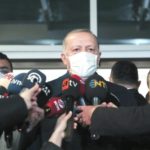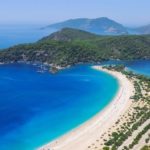Just a week before the Jan. 6 mob attack on America’s citadel of democracy, the U.S. Capitol, Turkish President Recep Tayyip Erdoğan waged a different kind of assault on one of his country’s last bastions of democratic thought, Boğaziçi University in Istanbul. Both events provide the latest evidence of how partisan politics and poisonous rhetoric, as championed by Erdoğan and President Donald Trump, can shake the pillars of a democratic society.
Erdoğan’s move against Boğaziçi – installing his own rector at a renowned and once-independent university — sparked instant reaction, apparently much wider in scope and tone than the government anticipated. It has prompted protests led by students and joined by the faculty at Boğaziçi that continue today, along with vigorous opposition on social media, in opinion pieces, and via petition campaigns at home and abroad. The situation risks sparking yet another faceoff between the secular, democratically oriented segment of Turkish society and a populist, authoritarian president who has grown increasingly intolerant of any demand that checks his power and seeks accountability.
Boğaziçi, where classes are taught entirely in English, is one of the best universities in Turkey and boasts a historic link with the United States. (Both of us earned degrees there, and one of us, Kemal, was a professor there for 24 years.) It rates in the top 200 on a list of 1,500 top universities worldwide in U.S. News & World Report’s ranking of Best Global Universities. The school was founded in 1863 as Robert College through the tireless efforts of a versatile educator from New England, Cyrus Hamlin, who also happened to be the brother of Hannibal Hamlin, Abraham Lincoln’s vice president.
Istanbul was then known as the Ottoman capital Constantinople, long before the Turkish republic came into being, and a civil war was raging in the United States, itself a fledgling republic. Despite the school’s origins in seminary work, this new institution made a point of opening “its doors to students of all races, nationalities and religions without prejudice or discrimination.”
Robert College eventually was incorporated into the Turkish higher education network and renamed Boğaziçi in 1971, as students at American universities at home and abroad were protesting the Vietnam War and their Turkish counterparts were grappling with ideological clashes on their own campuses. Boğaziçi was home to students holding diverse political views; it stood out for its ability to provide an atmosphere where political divides did not lead to the kind of violent confrontations that inflamed many other universities of the time.
A SHINING LIGHT
Similarly to Ronald Reagan’s boast that the United States is a ‘shining city on the hill,’ Boğaziçi has long been a shining light from the hills above the Bosporus Strait, the famed waterway dividing Asia from Europe. The university has traditionally represented Turkey’s western orientation, sought to educate young minds attuned to democratic principles and capable of critical thinking. It provides tuition-free education to a diverse body of students selected on merit alone. Any high school graduate, irrespective of religion, economic, or social background, can become a student at Boğaziçi if they receive the highest scores on a grueling entrance exam taken by close to 2.5 million young people every year.
The tradition of tolerance at Boğaziçi also manifested itself when it resisted compliance with the headscarf ban imposed in the late 1990s by the fiercely secularist state that predated control by Erdoğan’s Justice and Development Party (the AKP), upholding the primacy of the right to education. A rector at the time had worked with his colleagues to institute the practice of academic institutions electing their own presidents and rectors. Erdoğan wrested that authority for himself when he shifted Turkey from a parliamentary to a presidential system.
The atmosphere of academic independence, despite earlier attempts to curtail its autonomy even before the AKP dominated government, also benefitted the Boğaziçi faculty and students. Boğaziçi is the only Turkish university that continues to rank among the world’s top 200 universities, offering an alternative path to education that contrasts with Erdoğan’s vow to raise loyal and “devout generations.”
RECTOR BY DECREE
But on Jan. 1, Boğaziçi suffered a heavy blow to its record of independence, excellence, and tolerance. A presidential decree from Erdoğan announced that Boğaziçi had a new rector, Professor Melih Bulu, an individual dropped into this academic community seemingly by parachute, with total disregard for the established practice of asking the faculty’s opinion in the matter. None among the more than 400 academics that make up the core faculty at Boğaziçi were consulted in the selection process. Bulu was considered for the position by a committee at the Council of Higher Education that did not include a single member from Boğaziçi’s faculty.
Just as Trump chose not to recognize the legally confirmed results of the 2020 U.S. presidential election that he lost, Erdoğan chose not to recognize the need to respect and consult an academic community before putting their institution under the leadership of an individual with a flimsy resume in administrative matters and suspect academic credentials. Bulu is currently fighting allegations of plagiarism. His main qualification seems to be his close affiliation with the Turkish president and his AKP. As such, Bulu joins the ranks of an overwhelming share of the rectors at Turkish universities that have followed a similar career path. Petitions organized in Turkey and abroad call on Bulu to resign, though he shows no signs of complying.
These attacks on democracy that marked the first week of 2021 in Turkey and the United States may differ in nature and scale. But academic independence is no less essential in a democratic society than peaceful transition of power. U.S. democracy was an important model for a country like Turkey, with its young republican history. This week, in both countries, the resolve to protect democratic ideals and institutions was put to the test, each in its own way.
How did we come to this? How is it that these two fundamentally different countries have so dramatically revealed the fragile nature of democratic values and institutions? In the United States, a president’s insistence on one-man rule has divided the country and spun off unprecedented images streaming from the Capitol. In Turkey, a different kind of confrontation also reflects a wider polarization in Turkish society, because of its leader’s obsession with perpetuating personal power. The way Erdoğan chose to appoint the new rector for Boğaziçi reveals an intent to bring into his tight grip an institution that previously had resisted the kinds of attempts that destroyed other institutions in Turkey.
Congress, in its vote the night after the shocking storming of its chambers, verified the states’ certifications of President-elect Joe Biden’s rightful victory, and thus, at least for that moment, prevailed over Trump’s appalling move to serve his personal interests. And American democracy, with its thus-far robust, albeit strained, checks and balances, is holding off the forces of autocracy, though the struggle continues.
In Turkey, however, Erdoğan has long since stripped the country of any institutions that could check his power. For Turkey and Boğaziçi, the prospects look immeasurably more bleak.
By: Ayşe Candan Kirişci and Kemal Kirişci
Source: Brookings



